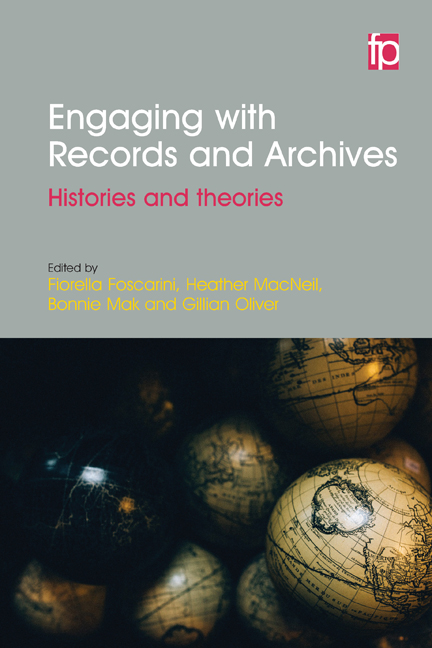Book contents
- Frontmatter
- Frontmatter
- Editors and contributors
- Editors’ introduction
- PART 1 RETHINKING HISTORIES AND THEORIES
- PART 2 ENGAGING RECORDS AND ARCHIVES
- 6 The use and reuse of documents by chancellors, archivists and government members in an early modern republican state: Genoa's Giunta dei confini and its archives
- 7 The bumpy road to transparency: access and secrecy in 19th-century records in the Dutch East Indies
- 8 Archival ethics and indigenous justice: conflict or coexistence?
- 9 History and development of information and recordkeeping in Malawi
- 10 History of community archiving in Poland
- 11 Reflecting on practice: artists’ experiences in the archives
- Index
9 - History and development of information and recordkeeping in Malawi
from PART 2 - ENGAGING RECORDS AND ARCHIVES
Published online by Cambridge University Press: 08 June 2018
- Frontmatter
- Frontmatter
- Editors and contributors
- Editors’ introduction
- PART 1 RETHINKING HISTORIES AND THEORIES
- PART 2 ENGAGING RECORDS AND ARCHIVES
- 6 The use and reuse of documents by chancellors, archivists and government members in an early modern republican state: Genoa's Giunta dei confini and its archives
- 7 The bumpy road to transparency: access and secrecy in 19th-century records in the Dutch East Indies
- 8 Archival ethics and indigenous justice: conflict or coexistence?
- 9 History and development of information and recordkeeping in Malawi
- 10 History of community archiving in Poland
- 11 Reflecting on practice: artists’ experiences in the archives
- Index
Summary
COLONIALISM, DECOLONIZATION AND economic adjustments in Africa are some of the major factors that have enabled public administrations in sub-Saharan Africa to experience four distinct eras. These are: the period prior to colonization; the period around the late 1880s when original African institutions were radically altered and replaced by the Western bureaucratic models; the 1960s, when the colonial bureaucracy was redefined and expanded after independence; and the period from the 1980s and beyond (structural adjustment and New Public Management programmes) when Africa's economic situation tumbled to its lowest ebb and needed major interventions for recovery and growth.
A sub-Saharan African nation, Malawi (formerly Nyasaland) has experienced four administrative epochs – the pre-colonial, colonial, postcolonial one-party and post-colonial democratic administrations. Through a careful analysis of the literature and official archival records, this chapter traces information sharing and recordkeeping practices during the four administrative dispensations in order to see how information generation and recordkeeping have evolved. While the chapter builds on the works of Mazikana (1986), who presents the development of archival services in Central Africa from the 1920s to the 1960s, and Lovering (2010), who discusses the development of Secretariat registry systems in Zambia and Malawi from the early colonial period to the early 1960s, it looks at pre-colonial information generation, sharing and preservation and offers a more detailed account of the developments of recordkeeping during the colonial and post-colonial periods than is provided by these two authors.
Pre-colonial administration and ‘record’ keeping
A description of the native system of government in the Yoruba country by ‘A Native of Yoruba’ (1902) is analogous to most of the pre-colonial tribal governments, such as those of the Chewa, Ngoni and Yao in Nyasaland. According to ‘A Native of Yoruba’, each tribe in the Yoruba country occupied a particular territory, which was regarded as a country on its own. At the apex of the native government was the supreme ruler, the king of the tribe. Different areas of the country were ruled in the name of the king by subordinate chiefs. Under each subordinate chief's jurisdiction were a number of villages, which were headed by village headmen.
- Type
- Chapter
- Information
- Engaging with Records and ArchivesHistories and Theories, pp. 173 - 194Publisher: FacetPrint publication year: 2016

